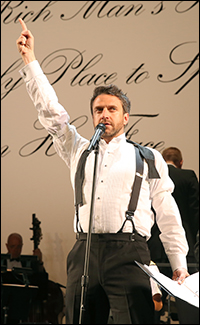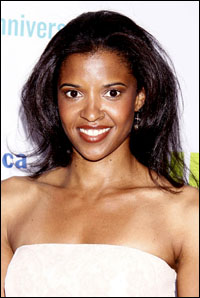
*
There's been extra excitement buzzing around New York City Center lately, and her name is Jeanine Tesori. The Tony-nominated composer of such shows as Thoroughly Modern Millie and Caroline, or Change has taken the reins of Encores! Off-Center and put together an outstanding inaugural season: Marc Blitzstein's The Cradle Will Rock, Gretchen Cryer and Nancy Ford's I'm Getting My Act Together and Taking It on the Road, and a one-night-only concert performance of Tesori's own Violet (written with lyricist/librettist Brian Crawley), which was one of the most acclaimed off-Broadway shows of the 1990s. Here, Tesori talks about Off-Center, the energy of off-Broadway, and the value of first instincts.
What was your first Off-Broadway experience?
Jeanine Tesori: It was when I went to see Godspell at what was the Promenade. I was fourteen, so that was a hundred years ago, and it's still visceral. I wasn't a kid from musical theatre — I literally thought Gypsy was a musical about Eastern Europe — so I had no preconceptions going in. And I will never forget the energy of sitting in a small theatre, and the very first time that the band kicked in, after the shofar played. It was the sense that, "I'm someplace where there's something happening, and I don't want to be anywhere else." For me, the beauty of a small theatre is the intimate relationship between the actors and the audience. One relies not on spectacle, but on the spectacular idea.
| |
 |
|
| Raúl Esparza in The Cradle Will Rock. | ||
| photo by Joan Marcus |
JT: When I first imagined the season I had many ideas, and these two shows were always on the list. I've always been in love with The Cradle Will Rock. And I've always wanted Sam Gold to do this piece. I first saw his work at Juilliard, when he did Threepenny Opera. And I didn't know him back then, but I left that theatre thinking, "Who is that? That person is seeing the world in an extraordinary way." I think this program is about artists meeting the work. I'm interested in the conversation between the director and the piece; I'm interested in watching why it's inevitable that they would steer this particular show. When we got the rights to Cradle, it became clear that Blitzstein's nephews were very interested in the way The Cradle Will Rock speaks as a piece of theatre pressing against the times we're in. Not as a quaint, dusty piece, but as a piece that was born of its social and political climate, and how it exists in this climate when we move that impulse to here and now. And that is what Sam does very well.
How do you think Getting My Act Together will fly today?
JT: I have no idea [laughs]. It will be very interesting to see. It's not a narrative per se; it's watching one woman trying to break out of something and putting it onstage for all to witness. I knew the score before I knew the piece, and I'm very much a champion of that team. Two women as a musical theater songwriting team — there aren't many doing that today. In fact, there are very few of us who almost exclusively write musical theatre or opera. And I'm not exactly sure why that is. What was true back then [when Cryer and Ford wrote Getting My Act Together] is still true now. Have Gretchen Cryer and Nancy Ford been involved with the Off- Center production?
JT: Yes, I've talked to them about it a lot. Gretchen and I went to the Lincoln Center library and watched her in the original production. It was the first time she watched herself, and it was really moving to see. They wrote the show in 1978 and there she was next to me. The whole reason I wanted to do this series was to have the now and the then co-exist in a very vital way. Not looking back at it fondly, but looking at how vital it is. What it was saying then, and what it still says in this time.
| |
 |
|
| Renee Elise Goldsberry will head the cast of I’m Getting My Act Together and Taking It on the Road | ||
| Photo by Joseph Marzullo/WENN |
JT: The Lobby Project came out of a desire to create context for these shows. I love this building and I love its history, and I wanted to experiment with it as a performance space as well. Everything is tied to what's being produced onstage. The visual artists are still making art with the same impulse with which I believe Blitzstein wrote Cradle. And the young women who are performing and writing poetry, they're doing that in the voice of 2013, while onstage are the voices of two women from thirty-five years ago at a turning point in their lives, trying to make sense of it.
In the spirit of Encores!, the rehearsal period is going to be very short.
JT: Yes. And we're not going to pretend that we're any deeper down the road than ten days into rehearsals. There are going to be scripts in the actors' hands to say, "This is where we are at this point." And I really enjoy that idea of not pretending that we are any further along than that. They're going to work incredibly hard to have something that's in a singular form early in its process. I've done daylong workshops where from the morning to the evening you can't believe the transformation. There's something astonishing about that short a process because people usually go with their first instincts.
Isn't it also really stressful?
JT: Oh, completely. When I did Twelfth Night with Nick Hytner at Lincoln Center, we worked so hard and it was only there for the summer. But he said, "There's something so beautiful about doing theatre like this because it's like cold water on a hot New York sidewalk. It just evaporates. It's there and then it's gone." And I love that.
(This feature appears in the July 2013 edition of the City Center Encores! Playbill magazine.)









